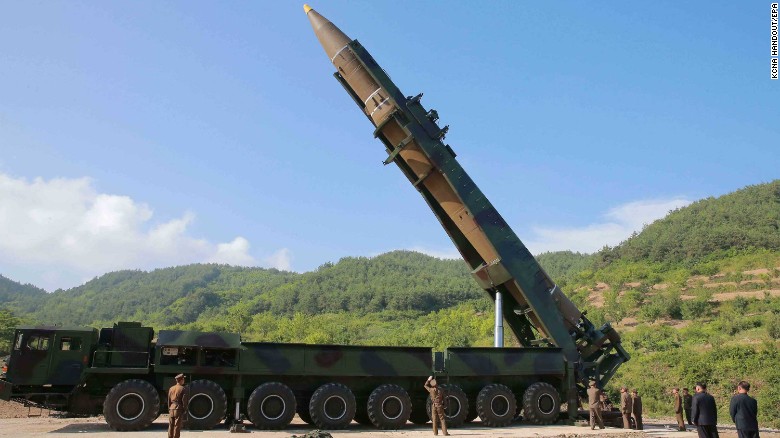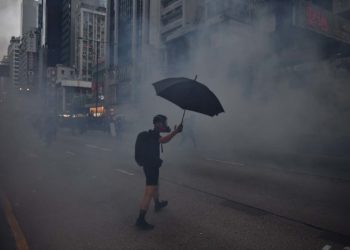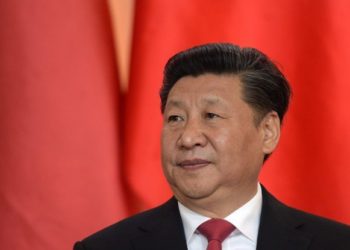Threatening the U.S. with a total nuclear destruction is North Korea’s favorite pastime. But U.S. officials always shrugged off their bombastic rhetoric, downplaying their ability to hit U.S. territories.
Nevertheless, recent successful tests of intercontinental ballistic missiles (ICBM), which theoretically could reach Alaska, has put Washington on edge. U.S. officials speculate that North Korea is a year away from developing a mini nuclear warhead that could fit on top of these missiles. Experts are still unsure if these missiles are tolerant to re-entry heating.
Last week, North Korea sparked a new round of fear and condemnation with the successful test of the ICBM. U.S. envoy to U.N. Nikki Haley tweeted that the “time for talk is over.”
Missile experts suggested the newly tested missile flew for a distance of 1,000 kilometers for 45 minutes. If fired on a standard trajectory, it could cover major U.S. cities including Los Angeles and Chicago.
“North Korea made a clear demonstration that it now has the capability of hitting the continental US,” Seong-Hyon Lee, senior research fellow at the Center for Korean Peninsula Studies at Peking University, told The Globe Post.
This missile test came just weeks after Pyongyang successfully tested its first ever ICBM. In 2017, North Korea has launched 11 ballistic missile tests.
In the wake of Pyongyang’s nuclear development, President Donald J. Trump vowed to take a tough stand against the regime.
On July 31, he told reporters at a Cabinet gathering that “we will handle North Korea. We’re going to be able to handle them. It will be handled. We handle everything.”
However, given the confusing remarks from the Trump administration, it seems the U.S. is still scrambling to figure out a policy on North Korea.
On Aug. 1, U.S. Secretary of State Rex W. Tillerson stressed that the U.S. is willing to talk with the regime of Kim Jong-Un. “We do not seek regime change. We do not seek an accelerated reunification of the peninsula. We do not seek an excuse to send our military north of the 38th parallel.”
Yet at the same day, U.S. Senator Lindsey Graham said on NBC that if North Korea continues its missile development, the U.S. will apply military operations to “destroy North Korea’s (missile) program and North Korea itself.”
Sangsoo Lee, senior research fellow at the Institute for Security & Development Policy, pointed out that the U.S. options are limited.
“Military measures are too risky and talks are too early since the US believes that North Korea’s nuclear warhead can’t reach the mainland US, as the country still doesn’t have ‘re-entry vehicle’,” he said.
North Korea’s longtime ally, China, seems not have many choices either.
A day after the missile test, Mr. Trump called on China and pressured it into making more action. He tweeted, “I am very disappointed in China. Our foolish past leaders have allowed them to make hundreds of billions of dollars a year in trade, yet they do NOTHING for us with North Korea, just talk. We will no longer allow this to continue. China could easily solve this problem!”
China has been North Korea’s biggest trade partner, representing 85 percent of total North Korean trade, according to a Washington D.C.-based research group C4ADS. In 2016, trade in anthracite coal made up over 46 percent of North Korean total export to China.
In February this year, Chinese Ministry of Commerce banned all coal imports from North Korea. In response to Mr. Trump’s criticism, China defended its efforts and hit back at Mr. Trump’s finger-pointing comment.
Chinese Vice Commerce Minister Qian Keming, replied at a news conference that nuclear issue and China-U.S. trade are “in two completely different domains” that should not be discussed together.
Chinese state media China Daily wrote in an editorial that Mr. Trump’s accusations are “unfair” and referred them as “simply a reflection of what has been his administration’s inaccurate assessment of the situation.”
Meanwhile, the editorial piece highly welcomed Mr. Tillerson’s “more rational perspective.” It is hoped the U.S. will now make concrete moves to translate Mr. Tillerson’s words into action, the editorial wrote, and the North will demonstrate its own sincerity to de-escalating tensions.”
While China was denouncing its small communist neighbor, Sangsoo Lee suggested that “it is unwilling to exert leverage on North Korea that could bring it to the brink of economic collapse and so trigger flows of refugees into China, as well as the US troops in the united Korea under South Korea’s domination.”
Moreover, if adding the South China Sea dispute and U.S. policy pivot in Asia, “China and the US cannot have cooperative relations and… China cannot simply alienate North Korea,” Sangsoo Lee said.
“Indeed, China could recover its relationship with North Korea to counter the US in the region.”
In The Economist’s cover story this week, the magazine said it is worth recalling that America has been here before.
“When Stalin and Mao were building their first atom bombs, some in the West urged pre-emptive strikes to stop them. Happily, cooler heads prevailed,” the Economist said.
Mr. Tillerson will head to Asia later this week for a regional meeting with ministers from North Korea, China, South Korea and Japan to discuss issues such as the denuclearization of the Korean Peninsula.
“The coming days and weeks will be a great disarray as experts and policy makers will be debating this confusing yet very important issue,” Seong-Hyon Lee said.
Before Mr. Tillerson’s visit, the U.S. proposed a draft resolution to be voted at the U.N. Security Council, aiming to cut North Korea’s $3 billion exports by a third.
The resolution will sanction any country purchasing North Korea’s exports of coal, iron, iron ore, lead, lead ore and seafood. Russia and China, as permanent members, must approve the resolution.




















